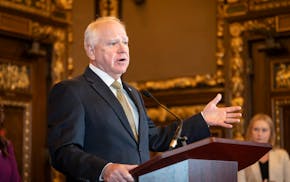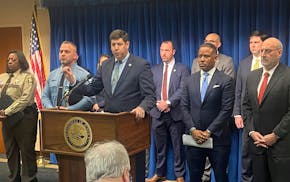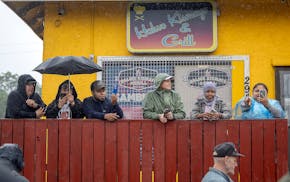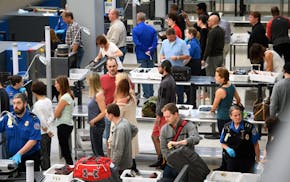Donald Trump's re-election could be a boon for the Minnesotans prosecuted for joining the mob on Jan. 6, 2021, that stormed the U.S. Capitol seeking to forcibly overturn the presidential election.
Among them are three brothers and a father from Lindstrom, a Minneapolis man convicted of assaulting officers and a Rochester woman who cheered on her fellow rioters as they attacked police who struggled to protect the building.
They're among more than 1,500 people charged with Capitol riot-related federal crimes, two-thirds of whom have been sentenced to terms ranging from probation or electronic home monitoring up to 22 years in prison. The mob left in its wake more than 100 police officers injured, some critically. Police gunfire killed one rioter inside the Capitol, and three other people died after medical emergencies during the chaos. In the weeks and months that followed, four of the officers who responded to the riot killed themselves.
Trump vowed to undo much of what became the biggest Justice Department investigation in history when he launched his re-election campaign more than a year ago. His first 2024 campaign rally — set in Waco, Texas — featured a rendition of the national anthem recorded by insurrection defendants via jail phone lines and mixed with Trump reciting the Pledge of Allegiance.
As he campaigned this year toward retaking the White House, Trump said numerous times that he would undo what prosecutors and the courts did to those "unbelievable patriots" who stormed the Capitol.
"If I run and if I win, we will treat those people from January 6th fairly," Trump said in January 2022 during a rally in Conroe, Texas. "And if it requires pardons, we will give them pardons because they are being treated so unfairly."
"I am inclined to pardon many of them," Trump also said on his social media platform earlier this year. "I can't say for every single one, because a couple of them, probably they got out of control."
Brad Hansen, a federal public defender who has represented three of the Minnesota defendants, said that he hopes the incoming administration "will provide a clear and detailed statement soon as to its plans with these cases."
"I hope that the current Department of Justice will then respect the new administration's plans, as it makes little sense to continue expending tremendous resources on cases that may well end with pardons or dismissals on or shortly after Jan. 20," Hansen said in an email referencing Inauguration Day. "I am very hopeful that my clients will be granted relief."
The U.S. Attorney's Office in the District of Columbia, which is prosecuting the Jan. 6 cases, declined to comment for this story. Federal prosecutors have made no public statements or court filings indicating that they planned to do anything differently in the waning months of the Biden administration. Several judges have since refused motions to delay sentencings or trials that were filed by defendants who have cited the prospects of a presidential pardon.
A waiting game
Four family members from Lindstrom, Minn. — Robert, Jonah and Isaac Westbury and Aaron James — have been awaiting trial for more than three years since first being indicted in 2021 on charges related to storming the U.S. Capitol. Robert's wife, Rosemarie Westbury, launched a crowdfunding effort that has since raised more than $62,000 and has appeared on local and national conservative media in the years since the charges were first filed. Rosemarie Westbury traveled with the family to Washington, D.C., in January 2021 but has not been charged with a crime.
Video of the Capitol siege showed Robert, Jonah and Isaac Westbury with a pro-Trump mob that entered the Capitol. Other videos, including footage released by the Justice Department, appear to show Isaac Westbury and Aaron James using law enforcement shields to try to charge past police guarding a tunnel entrance.
A trial for the family was set to finally start this month, but a judge rescheduled it for August 2025. That was in response to a motion to reschedule because defense attorney Anthony Sabatini, also a member of the Florida National Guard, is being deployed to assist with Hurricane Milton relief efforts. Prosecutors did not oppose the scheduling change.
Sabatini, one of several attorneys representing each of the four Westbury family members, said he will be "pushing for a voluntary dismissal" of all charges by the Justice Department. Sabatini added that the defense team is "waiting to see who is named White House Counsel."
As president, Trump used his singular authority to pardon or commute the sentences of numerous political allies, friends and associates, including his former chief strategist, Steve Bannon; his former campaign chair, Paul Manafort; his former national security adviser, Michael Flynn; and a longtime friend and political ally, Roger Stone.
A pardon is an expression of forgiveness by the president, commonly granted to recognize that a person convicted of a crime has accepted responsibility for their actions. A pardon doesn't mean the person is considered innocent, but it does restore some rights, such as voting, that are lost upon conviction. A commutation reduces a sentence but does not affect a conviction.
The Minnesota 15 have been charged with various crimes, from misdemeanors to felonies alleging violent acts against the members of law enforcement, who were overwhelmed by the thousands of insurrectionists trying to prevent Congress from certifying the Electoral College tally that declared Joe Biden the winner over incumbent Trump.
Seven of them are still waiting to go to trial, two as soon as Jan. 13, one week before Trump is inaugurated, and another in January after Trump takes office.
Of the eight who have been sentenced, most served little to no time imprisoned for their largely nonviolent offenses. Some sentences included home detention or probation.
The most severely punished among the Minnesotans was Brian Mock. The 45-year-old Minneapolis man received a 2¾-year term in February after telling the judge that his violent acts during the storming of the Capitol were "a moment that I got caught up in."
With credit for the time he spent in jail after his arrest, Mock is scheduled to leave prison on July 2.
Prosecutors said video showed Mock committing four assaults during the violence outside the Capitol. They said he threw a broken flag pole at a line of police and after pushing down two officers, and tried to kick one of them. They said Mock shoved another officer in the back. He was also charged with taking two police riot shields and obstructing an official proceeding.
Jon Lewis, a research fellow at the George Washington University Program on Extremism, said participants such as Mock — "unaffiliated lone actors who committed mob violence against law enforcement" on Jan. 6, 2021 — represented a "dangerous element."
"Despite not being part of an organized domestic violent extremist group, Jan. 6 participants like Mock were willing to commit acts of violence against sworn members of law enforcement attempting to defend the nation's Capitol," Lewis said. "Pardons for violent members of the mob like Mock would send a dangerous message to domestic extremists."
Lewis called the likelihood of Jan. 6 pardons a "repudiation" of the entire Justice Department investigation and "the entire legal process that we have here." He warned that pardons would "would serve to even further embolden future anti-government extremists."
"It will normalize further political violence," Lewis said. "It will send a message to would-be insurrectionists across the country that even if you don't succeed, the next time you attempt to attack the U.S. Capitol, you very well may be pardoned for it four years down the line."
One defendant, 44-year-old Martin Cudo, of Lakeville, is scheduled to go on trial Jan. 27, a week after Trump is sworn in, on some of the same charges that were filed against several of his fellow Minnesotans: obstructing an official proceeding, entering a restricted area, disorderly or disruptive conduct and parading, demonstrating or picketing in a Capitol building.
Prosecutors say Cudo was among the many others who breached police barricades before entering the Capitol. Along with interior video surveillance images of Cudo's movements, the criminal complaint includes what the prosecution says is a selfie he took while wearing a COVID mask patterned after the American flag and a red, white and blue "Trump 45″ cap. He eventually gave in to police demands and left the Capitol with other rioters shortly before 3 p.m. but remained on the grounds until about 5 p.m., the complaint read.
"I'm intrigued by the possibility of a pardon," Cudo said in an interview with the Star Tribune one week after Trump's defeat of Vice President Kamala Harris.
Cudo explained that he, his mother and her husband traveled to Washington together, but he left them behind at the rally and joined the march to the Capitol on his own.
"There were bad guys there," he said. "I was in the wrong place at the wrong time. I'd take it all back if I could."
Asked whether he felt any extra weight of consequence when he voted on Nov. 5, given the direct and immense impact the outcome could have on his life, Cudo said, "I don't see how anyone wouldn't feel that way."
The Associated Press contributed to this report.

Walz: State had no advance notice of federal raid in Minneapolis

Five members of Minneapolis Highs street gang found guilty of racketeering conspiracy

Midea recalling 1.7 million of its popular air conditioners due to mold concern

Social media, text chains helped anti-ICE protesters get the word out during Minneapolis raid
